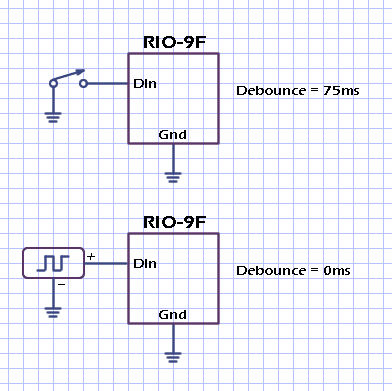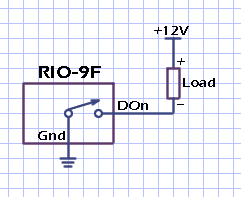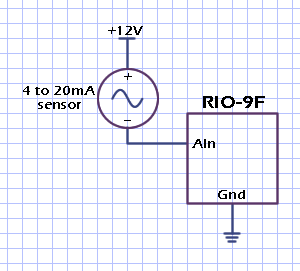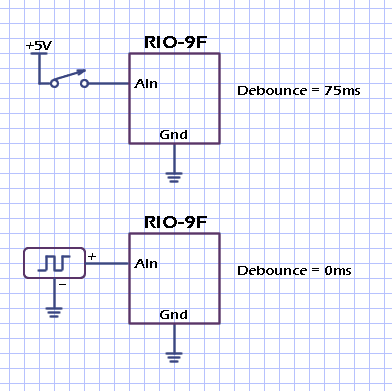When used as digital inputs, the analog inputs have a polarity opposite of that of the dedicated digital inputs.

All RIO-9H models connect to power and user signals via a single, green, screw-terminal connector. Each pin on this connector is defined by the white, silk-screen text printed on the circuitboard, just behind the connector itself:
positive DC power for the I/O board
open collector, digital outputs; When the associated DO LED is lit, the output is pulled to ground. Each output is rated at 200mA max.
optically-isolated digital inputs; These inputs are pulled high internally, and suitable for connecting to most Form A or TTL outputs.
ground; Negative DC power for the I/O board and electrical reference point for all inputs and outputs.
dual-use analog inputs; Each input is capable of measuring a signal from 0 to 20mA, or as acting as an additional digital input. The module presents a 250Ω load on each input.
RIO models RIO-9H-232 and RIO-9H-232-28 communicate serially via a DB-9 connector. The following DB-9 pins are defined:
transmit data, from the I/O board to the user device
receive data, from the user device to the I/O board
ground; interface common
clear to send; pulled high to indicate that the RIO-9H may send data
ready to send; a high signal indicates that the RIO-9H needs to send data
Most installations do not require hardware handshaking. In such cases, you can connect the CTS pin directly to the RTS pin, or disable handshaking with the configuration utility.
RIO models RIO-9H-485 and RIO-9H-485-28 communicate serially via a DB-9 connector. The following DB-9 pins are defined:
positive RS-485 signal
negative RS-485 signal
Digital inputs should be driven to ground to signal "on".

Use a Debounce value of 75 for mechanical inputs and a Debounce value of 0 for digital inputs.
RIO-9H outputs are pulled to ground when "on". They can sink up to 200mA. Here is a typical configuration that uses the output to control a user load:

Analog inputs can sense a range of 4 to 20 mA. Here is a typical configuration that uses the analog input to monitor the current through a sensor.

The RIO-9H device's analog inputs can also be used as digital inputs. These inputs are pulled low internally and should be driven to +5VDC to signal "on".

When used as digital inputs, the analog inputs have a polarity opposite of that of the dedicated digital inputs.
